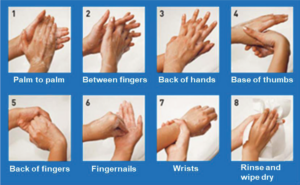I am colonised/have an infection- what does this mean?
Enterobacteriaceae are bacteria that usually live harmlessly in the guts of humans. This is called ‘colonisation’ (a person is a carrier). However if the bacteria get into the wrong place, such as the bladder or bloodstream they can cause infection.
Carbapenems are one of the most powerful types of antibiotics. Carbapenemases are enzymes (chemicals) made by some strains of these bacteria, which allow them to destroy carbapenem antibiotics and so the bacteria are said to be resistant to the antibiotics.
Why does Carbapenem resistance matter?
Carbapenem antibiotics can only be given in hospital directly into the bloodstream. Until now, doctors have relied on them to successfully treat certain ‘difficult’ infections when other antibiotics have failed to do so. In a hospital, where there are many vulnerable patients, spread of resistant bacteria can cause problems.
Does carriage of Carbapenemase-Producing Enterobacteriaceae need to be treated?
If a person is a carrier of carbapenemase-producing enterobacteriaceae (sometimes called CPE), they do not need to be treated. However, if the bacteria have caused an infection then antibiotics will be required.
How did I pick up CPE?
Do ask your doctor or nurse to explain this to you in more detail. As mentioned previously, sometimes this bacteria can be found living harmlessly in the gut of humans and so it can be difficult to say when or where you picked it up.
However there is an increased chance of picking up these bacteria if you have been a patient in a hospital abroad or in a UK hospital that has patients carrying the bacteria, or if you have been in contact with a carrier elsewhere.
How will I be cared for whilst in hospital?
You will be accommodated in a single room with private toilet facilities whilst in hospital. You may be asked to complete 3 anal swabs, to check if you are still carrying the bacteria. These will be taken on alternative days. You will normally be informed of the results within 2-3 days.
How can the spread of CPE be prevented?
Accommodating you in a single room helps to prevent spread of the bacteria. Healthcare workers should wash their hands regularly. They will use gloves and aprons when caring for you.
The most important measure for you to take is to wash your hands well with soap and water, especially after going to the toilet. You should avoid touching medical devices (if you have any) such as your urinary catheter tube and your intravenous drip, particularly at the point where it is inserted into the body or skin.
Visitors will be asked to wash their hands on entering and leaving the room and may be asked to wear appropriate Personal Protective Equipment (PPE), ward staff will advise.
What about when I go home?
Whilst there is a chance that you may still be a carrier when you go home, quite often this will go away with time. No special measures or treatment and required; any infection will have been treated prior to your discharge. You should carry on as normal, maintaining good hygiene.
If you have any concerns you may wish to contact your GP for advice. Before you leave hospital, ask the doctor or nurse to give you a letter or card advising that you have had an infection or have been/are colonised with CPE. This will be useful in the future and it is important that you make health care staff aware of it.
Should you or a member of your household be admitted to hospital, you should let the hospital staff know that you are, or have been a carrier and show them the letter/card.
Hand hygiene
The role of hand hygiene can help us prevent the spread of infection.
How to wash your hands effectively with soap and water:
- Wet hands thoroughly before applying soap.
- Vigorously rub all surfaces of both hands with soap lather.
- Pay special attention to the finger tips, thumbs and between fingers (these areas are frequently missed when washing hands).
- Rinse off all the soap under running water and dry hands thoroughly.
- Always cover cuts with waterproof plasters.
- When you can, apply hand cream as this helps to prevent dryness and chapping.

Where can I get more information?
If you would like further information please speak to a member of your care staff, who may also contact the Infection Prevention and Control Team for you.
The UK Health Security Agency (UKHSA) website is another source of information:
https://www.gov.uk/government/organisations/uk-healthsecurity-agency
Infection Prevention and Control contact details
You can contact the team Monday – Friday between 9am – 5pm on the following numbers:
Bedford
01234 795848
Luton
01582 497321
